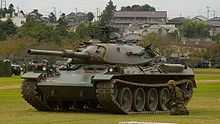Type 74
| Type 74 | |
|---|---|
|
Type 74 | |
| Type | Main battle tank |
| Place of origin | Japan |
| Service history | |
| In service | 1975 – present |
| Production history | |
| Designer | Mitsubishi Heavy Industries |
| Designed | 1962 |
| Manufacturer | Mitsubishi Heavy Industries |
| Produced | 1975 – 1988 |
| Specifications | |
| Weight | 38 tonnes (42 short tons; 37 long tons) |
| Length | 9.41 m (30 ft 10 in) |
| Width | 3.18 m (10 ft 5 in) |
| Height | 2.25 m (7 ft 5 in) |
| Crew | 4 |
|
| |
| Armor | 189–195 mm (7.4–7.7 in) |
Main armament |
Royal Ordnance L7 rifled gun 55 rounds |
Secondary armament |
M2HB 12.7-mm machinegun 660 rounds Type 74 7.62-mm machinegun 4,500 rounds |
| Engine |
Mitsubishi 10ZF Model 21, 10 cylinders diesel, 21.5 L 750 hp (560 kW) |
| Power/weight | 19 hp/tonne |
| Suspension | hydropneumatic |
Operational range | 300 km (190 mi) |
| Speed | 53 km/h (33 mph) |
| ||||||||||||||||||||||||||||||
The Type 74 (74式戦車 nana-yon-shiki-sensha) is a main battle tank (MBT) of the Japan Ground Self-Defense Force (JGSDF). It was built by Mitsubishi Heavy Industries as a replacement for the earlier Type 61. It was based on the best features of a number of contemporary designs, placing it in the same class as the US M60 or German Leopard 1. Like these designs, it mounts the Royal Ordnance L7 105 mm gun. The design did not enter widespread use until 1980, by which point other western forces were starting the introduction of much more capable designs.
History
The JGSDF started studies on a new tank design with Mitsubishi in 1962, as it was realized that the Type 61 would not be able to defeat the latest Soviet designs like the T-62. Features from several designs were incorporated, including the controllable suspension of the US-German MBT-70 project, the hull of the Leopard 1, and the L7 105mm gun. The design included a rotating cupola for the commander, and a new autoloader for the main gun. The design was finalized in 1964 and various test rigs were built between 1964 and 1967.
The first prototype, designated STB-1, was delivered in late 1968 and underwent a number of modifications until 1969. The autoloader proved too complex and expensive, and was removed, additionally the remote controlled anti-aircraft machine gun was removed. The design of the turret was also changed, becoming longer. These changes resulted in the STB-3, which was delivered in 1971. The final prototype designated STB-6 was delivered in 1973. Production finally started as the Type 74 in September 1975, with 225 being delivered by January 1980. Production ended in 1989, with total production running to 893 examples.
In service, the tanks were updated with the addition of infra-red imagers (not image intensifiers) for the commander and gunner, and a laser rangefinder in the commander's cupola. The gunner's position included a digital fire control computer, fed range data from the commander's range finder. Rounds for the main gun were upgraded from HEP to APFSDS and HEAT-MP.
The Type 74 tank has the Mitsubishi 10ZF Model 21 10-cylinder two-stroke cycle diesel engine providing 750 hp (560 kW). At 19 hp/tonne, its power-to-weight ratio is similar to the French AMX-30. The maximum quoted road speed of the Type 74 is 53 km/h but its top speed is at least 60 km/h.[1][2]
The Type 74 was generally outdated even before it entered service. The Type 90 was to have replaced it outright, but with the ending of the Cold War these plans were scaled back. In 1993 four Type 74's were improved to the new Type 74 Kai (改) [Type 74 mod G (G型)] standard, adding a passive infrared camera, side skirts, and so on. The upgrade proved to be extremely expensive, and the program was dropped.
Variants

- Type 74 first mod (74式戦車 初期生産型)
- Type 74 mod B (74式戦車 B型)
- Type 74 mod C (74式戦車 C型)
- Type 74 mod D (74式戦車 D型)
- Type 74 mod E (74式戦車 E型)
- Type 74 mod F (74式戦車 F型)
- Type 74 mod G/Kai (74式戦車 G型/改)
- Type 87 Self-Propelled Anti-Aircraft Gun (87式自走高射機関砲)
- Type 78 Armoured recovery vehicle (78式戦車回収車)
- Type 91 Armoured vehicle-launched bridge (91式戦車橋)
Operators
![]() Japan - 893 produced between September 1975 and 1989, with 225 being delivered by January 1980. 822 in service in 1990, 870 in service in 1995 and 2000, 700 in service in 2006.[3]
Japan - 893 produced between September 1975 and 1989, with 225 being delivered by January 1980. 822 in service in 1990, 870 in service in 1995 and 2000, 700 in service in 2006.[3]
See also
Type 61 - Type 74 - Type 90 - Type 10
References
- ↑ Type 74, Main battle tank, Army Guide
- ↑ "Type 74 (Nana-yon) - Main Battle Tank". =Militaryfactory.com.
- ↑ Ground Self-Defense Forces
External links
| Wikimedia Commons has media related to Type 74. |
| ||||||||||||||||||||||||||||||||||||||||||||||||||||||||||||||||||
| ||||||||||||||||||||||||||
.jpg)